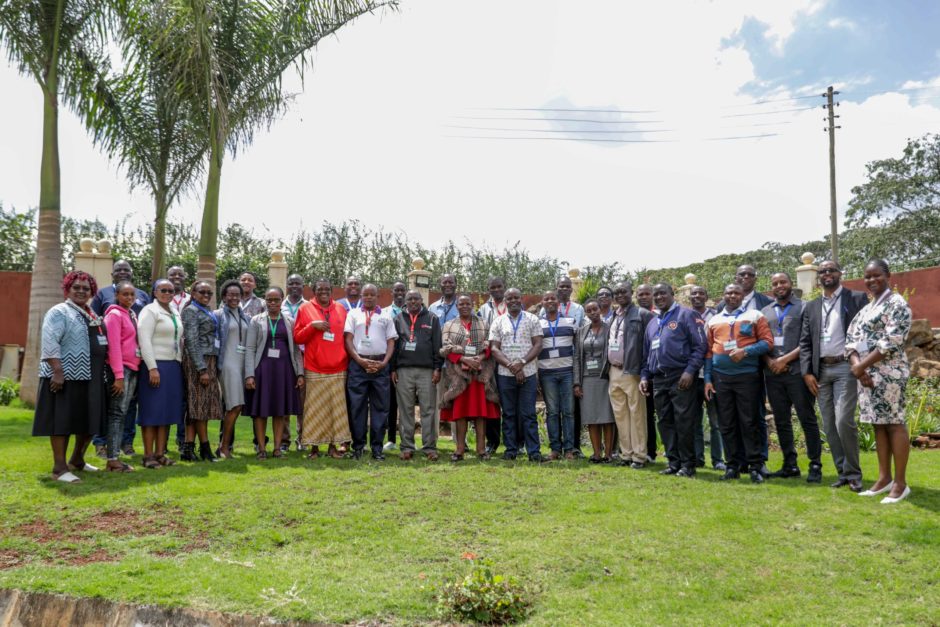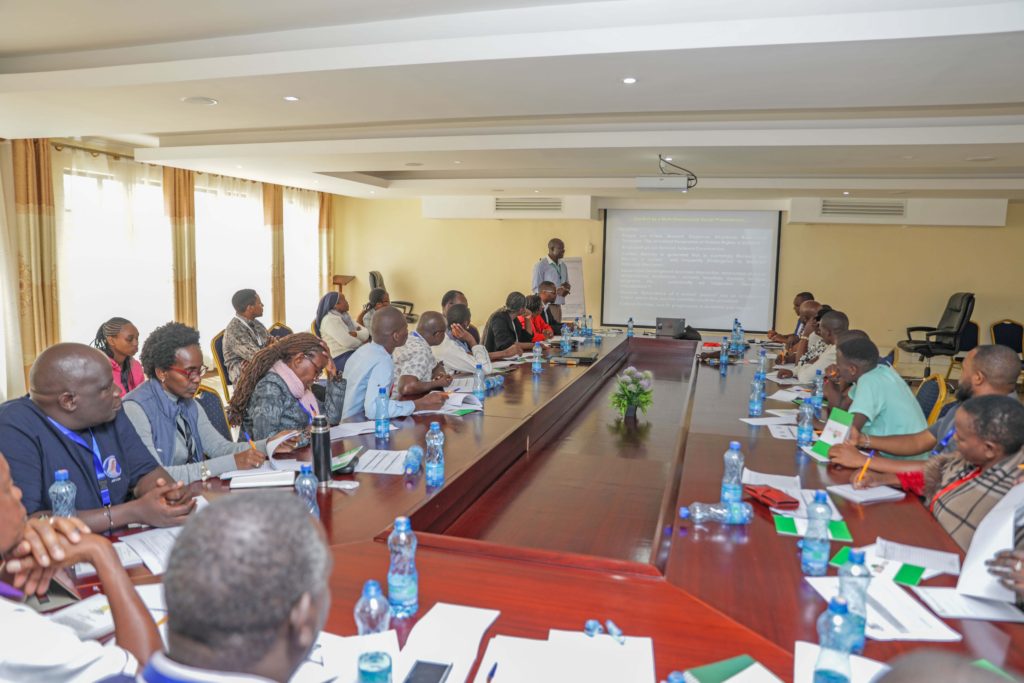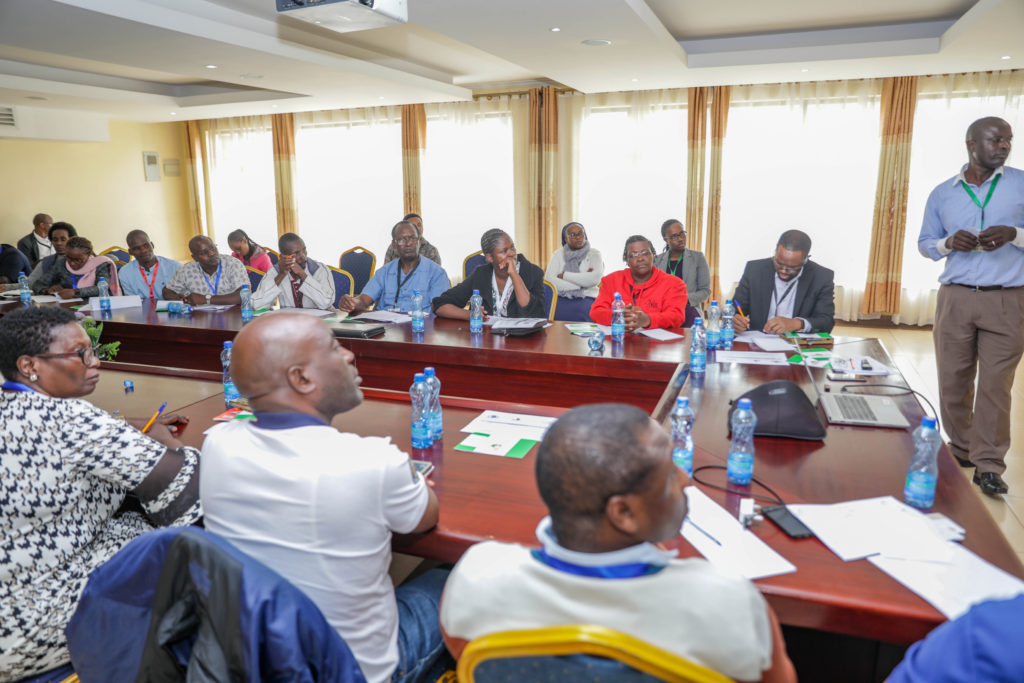By: Esther Kibe MA,
In view of Shalom’s much-acclaimed conceptualization of leadership empowerment in the community, the organization underscores the critical importance of collaborative engagement between grassroots and middle-level opinion shapers (https://shalomconflictcenter.org/wp-content/uploads/2023/06/13-Years-of-Shalom-SCCRR-2009-2022-SV-20230624.pdf). It is in this context that Shalom responded to the invitation by the Archdiocese of Nairobi Justice & Peace Department (CJPD). The commission reached out to the Shalom-SCCRR unit in Africa led by Fr. Patrick Devine PhD, Oliver Noonan, PhD candidate, Esther Kibe MA, and Arthur Magero MA, to enhance the capacity of their commissioners in Conflict Transformation and Peacebuilding through enlightened training and empowerment. This response considered the justice, peace, and environmental challenges that grassroots communities encounter, and the capacity deficiencies that the commissioners face in addressing these issues in society. Inter-religious dialogue, praxis, and collaboration also benefit’s immensely from trained, enlightened actors.

Shalom-SCCRR’s Ms. Esther Kibe MA, empowering the CJPD members on the four dimensions of conflict transformation (personal, relational, structural, and cultural dimensions).
This training workshop was also in accordance with one of the Shalom-SCCRR’s objectives which seeks to strengthen the capacities of religious organizations, civil society organizations, and NGOs in Eastern Africa with Conflict Transformation and Peacebuilding.
In his opening remarks Fr. Patrick Kimani (LLM), the Director of the CJPD Archdiocese of Nairobi noted that the invitation to Shalom-SCCRR was in line with the commission’s goal of sensitizing individuals, communities, and the whole nation on matters of justice and peace.

An aerial view of Kibera slums, where Shalom-SCCRR works. It’s one of the slum areas in the Archdioceses of Nairobi.
The members in attendance were from Nairobi and Kiambu Counties which constitute the Archdiocese of Nairobi. The archdiocese covers an area of 3,721 sq. Km and has one hundred and fourteen (114) parishes with over four thousand (4,000) small Christian communities. The commission is constituted of members drawn from the Small Christian communities of different parishes. This helps in ensuring that there is a proper and qualified representation of different parishes and local community members. The two counties are predominantly characterized by varying urban lifestyles ranging from informal settlements, middle-level lifestyles, and affluent standards of living which necessitate the prevalence of diverse justice and peace-related issues that require attention.
Populations living in the informal settlements are faced with a myriad of challenges mainly extreme poverty, poor housing, inter-ethnic violent conflicts, violence against women and children, and youth radicalisation into violent religious-political extremism, among others. Populations living in formal settled residential areas also face huge challenges from insecurity, economic pressures, violent extremism, and potential ethnic balkanisation among other pressing difficulties.

Shalom-SCCRR’s Sr.Jovalet Ariho (MA Candidate), leading an interactive discussion with the commissioners on their role in conflict interventions in their communities.
Mrs. Florence Shabati, one of the CJPD commissioners who is also a government security officer, observed that “Shalom’s work is of great importance to everyone in the society to address the differences that emerge from the diverse religious ideations, social status and political ideologies.”
She further noted, “I can attest to the lack of proper conflict resolution and conflict transformation knowledge and skills in many sectors. On many occasions one has to deal with complex conflict issues such as crime and drug abuse, negative ethnicity, political intolerance, radicalisation, religious-ideological extremism, land disputes, and domestic and sexual violence, just to mention a few. The community lacks the necessary knowledge and skills in analysing, addressing, and transforming these issues. Each one of us attending this training workshop has an individual responsibility to empower our communities with the necessary peace-building knowledge and skills.”

Shalom-SCCRR’s Mr. Arthur Magero MA, facilitating a training session on the Paradigms of Conflict Analysis (Realism, Structuralism & Conflict Research). On his right is Fr. Patrick Kimani (LLM), the Director of the CJPD Archdiocese of Nairobi.
These commissioners were empowered with analytical skills and techniques for Conflict Transformation and Peacebuilding respectively. The training focused on Paradigms of Conflict Analysis and the four dimensions of conflict transformation. This will help them to analyze the underlying causes of conflict, design strategic interventions for the prevention and transformation of the inter-ethnic and inter-religious violent conflicts in their communities.
Fr. Kimani appreciated Shalom-SCCRR’s work and commitment to conflict transformation and peacebuilding. He commended Shalom’s unique methodology and the vital role they play in the training of CJPD commissioners. “We are grateful to Shalom for honoring our invitation and conducting a well-organized and coordinated training workshop to our commissioners. They will greatly benefit from the organization’s vast experiences in conflict transformation and peacebuilding in Eastern Africa and their commitment to transforming violent conflicts in different conflict environments.”
Recognising the value of the training, Ms. Brenda Wanyonyi noted that, “these trainings are very relevant, informative and timely. The country has just been through a very competitive electioneering process, and there are political demonstrations that are causing a lot of anxiety and tension currently in various parts of the country. We will therefore share the knowledge and skills we have acquired with our fellow parishioners and local community members so that they can be able to analyze, resolve and transform the different forms of violence they experience in their environments. ”

Shalom-SCCRR’s Ms. Esther Kibe MA, guiding the participants in a conflict analysis session on the underlying causes and drivers of conflict in their parishes and local communities.
Fr. John Mbugua, CJPD chaplain from Gatundu, Kiambu County, emphasizing the value of the training to religious leaders stated; “this has been a very enlightening moment for me as a leader in my parish. I have particularly benefited from the new understanding of the differences between negative and positive peace.” He added; “The concept of structural violence which was well elaborated, will be essential for us religious leaders in understanding the structural causes of conflicts at our local community levels.”
Fr. Thomas Ngong, a priest from Nairobi further observed; “we have to play an active role in ensuring that our parishioners and communities are able to address and subjugate the different forms of violence they are facing in their lives. With continued empowerment, we will be able to evangelize and be better ambassadors of peace.”
Shalom-SCCRR continues to empower key opinion leaders to be agents of peace and reconciliation. The trained CJPD representatives will continue building the capacities of other CJPD officers, parishioners, and local community members to be the architects of their own interdependent future as peaceful and reconciled communities.Shalom-SCCRR continues to work and collaborate with religious organizations and other relevant stakeholders in the realization of the organization’s vision of ‘A society where Peace, Justice, and Reconciliation prevails throughout Africa.’
Author:
Ms. Esther Njeri Kibe MA, Shalom-SCCRR, Project Officer Marsabit and Women Projects
Shalom-SCCRR Coordinator with the ADN
See also a write-up posted by the Archdiocese of Nairobi.

ARCHDIOCESAN CJPD MEMBERS RECEIVE TRAINING ON CONFLICT RESOLUTION AND RECONCILIATION PROCESS
By ADN Communications
The Archdiocesan Catholic Justice and Peace Department (C.J.P.D) conducted a two-day workshop on transformation and the manifest of violence, held at the Clergy home in Ruaraka.
C.J.P.D partnered with Shalom Center for Conflict Resolution and Reconciliation – SCCRR, a non-governmental office that empowers people on ways of resolving conflicts. The training aimed to educate C.J.P.D officers across the archdiocese on the importance of upholding and maintaining peace in society.
Rev. Fr. Patrick Ndung’u, the C.J.P.D director, speaking after the training explained the importance of conducting the training in all the parishes in the Archdiocese. He stated that the end result would be for them to cascade down the information to other parishioners and above all to be agents of peace.
The training was attended by over 50 C.J.P.D representatives and deanery chaplains from across the archdiocese. SCCRR works to end the Cycle of Inter-Ethnic and Inter-Religious violence, in the tribal lands of Eastern Africa and informal urban settlements. They aim to empower local communities to be the architects of their own interdependent future of reconciled coexistence.


- Shalom Empowerment Center (SEC) Addressing Violence against Women and Children: A Unique Shalom-SCCRR Initiative Opened. https://shalomconflictcenter.org/shalom-empowerment-center-sec-addressing-violence-against-women-and-children-a-unique-shalom-sccrr-initiative-opened/
- https://www.shalomconflictcenter.org/wp-content/uploads/2014/12/CARDINAL-NJUE.pdf
- Shalom- SCCRR. (2023) 2009-2022 Shalom-SCCRR Results and Achievements. https://shalomconflictcenter.org/wp-content/uploads/2023/06/13-Years-of-Shalom-SCCRR-2009-2022-SV-20230624.pdf
- Shalom-SCCRR. (2022). Shalom Empowerment Center (SEC) Addressing Violence against Women and Children: Concept Document. https://shalomconflictcenter.org/eastern-africa-shalom-empowerment-center-sec-addressing-violence-against-women-and-children-concept-document/
- Shalom-SCCRR. (2023). Prof. Wanakayi K. Omoka’s Understanding of the Philosophy and Work of Shalom-SCCRR Recollected; Augmented with 2022 Results by the Dept. of Monitoring, Evaluation, Research, and Learning (MERL). https://shalomconflictcenter.org/recalling-prof-wanakayi-k-omoka-phd-understanding-of-the-philosophy-and-work-of-shalom-sccrr-augmented-with-2022-shalom-sccrrs-achievements-and-results/
- Awed, A. (2021). The Girl-Child: Shalom-SCCRR Impacting Education & the Lives of Young Girls in Marginalized and Remote Locations in Eastern Africa. https://shalomconflictcenter.org/the-girl-child-shalom-sccrr-impacting-the-lives-of-young-girls-in-marginalized-and-remote-locations-in-eastern-africa/
- Domit, P. (2023). Wonderful Welcome and Experience with the Shalom Center for Conflict Resolution and Reconciliation (SCCRR). https://shalomconflictcenter.org/wonderful-welcome-and-experience-with-the-shalom-center-for-conflict-resolution-and-reconciliation-sccrr/
- Shalom-SCCRR. (2023). Shalom Empowerment Center (SEC) 2022 Results & Achievements. https://shalomconflictcenter.org/shalom-empowerment-center-sec-2022-results-and-achievements/
- Otsieno, J. & Kibe, E. (2022). Shalom Empowerment Center (SEC) Addressing Violence against Women and Children: A Unique Shalom-SCCRR Initiative Opened. https://shalomconflictcenter.org/shalom-empowerment-center-sec-addressing-violence-against-women-and-children-a-unique-shalom-sccrr-initiative-opened/
- Adhiambo, V. (2023). Bridging Divides: A Personal Account of Working with the Shalom Center for Conflict Resolution and Reconciliation. https://shalomconflictcenter.org/bridging-divides-a-personal-account-of-working-with-the-shalom-center-for-conflict-resolution-and-reconciliation/
- Tembo, E. (2023). St. Josphat’s House (Kabiria-Riruta), A Place To Go; Some Shalom-SCCRR Projects in Action. https://shalomconflictcenter.org/st-josphats-house-kabiria-riruta-a-place-to-go-some-shalom-sccrr-projects-in-action/
- Devine, P. R. (2023). Shalom-SCCRR Chairman’s Report on Progress and Achievements in 2022. https://shalomconflictcenter.org/chairmans-report-on-progress-and-achievements-in-2022/
- Shalom Center for Conflict Resolution and Reconciliation Training for the Prevention of Election Violence in Kenya. https://www.shalomconflictcenter.org/wp-content/uploads/2014/12/February_Newsletter-1-1.pdf
- Shalom-SCCRR Peace and Development Practitioners on the forefront in the Community-based fight against the COVID-19. https://shalomconflictcenter.org/shalom-sccrr-peace-and-development-practitioners-on-the-forefront-in-the-community-based-fight-against-the-covid-19/
- Introduction to the Mary and Joseph Life Center (MJLC): Where Families Matter. https://maryandjosephlifecenter.org/introduction-to-the-mary-and-joseph-life-center-mjlc-where-families-matter/
- Shalom-SCCRR Facilitates at AMECEA Forum on Addressing Religious Ideological Extremism in Eastern Africa. https://shalomconflictcenter.org/shalom-sccrr-facilitates-amecea-forum-on-addressing-religious-ideological-extremism-in-eastern-africa/
- Shalom Signs Memorandum of Understanding With Association of Member Episcopal Conferences in Eastern Africa. https://shalomconflictcenter.org/shalom-signs-agreement-with-member-episcopal-conferences-of-africa/
- Kenya: Fr Patrick Devine appointed to Council of Tangaza University College. https://www.indcatholicnews.com/news/40120
- Promoting peace, development and empowerment in Africa. https://www.ucanews.com/news/promoting-peace-development-and-empowerment-in-africa/98244
- Fr. Adilleta succeeds Fr. Devine as Chair of RSCK. http://cananews.blogspot.com/2010/01/fr-adilleta-succeeds-fr-devine-as-chair.html, https://shalomconflictcenter.org/wp-content/uploads/2023/08/RSCK-ARTICLE-2010-12-20.pdf

